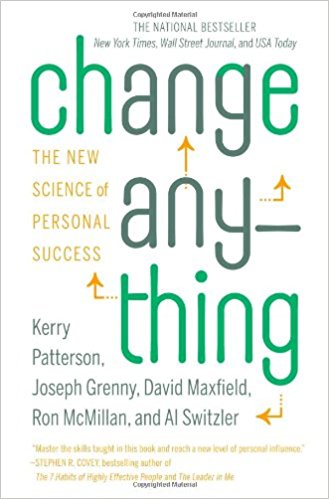“Assume a virtue, if you have it not.
…. Refrain to-night,
And that shall lend a kind of easiness
To the next abstinence: the next more easy.”
-Hamlet, Act III, Scene IV
We are continuing a series focused on making personal changes. Patterson, Grenny, Maxfield, McMillan, and Switzler’s (2011) identified six sources of influence in Change Anything: The New Science of Personal Success.
The Six Sources of Influence
The six sources of influence are listed below:
Source 1 – Personal motivation (What do you need to do to “love what you hate?”)
Source 2 – Personal ability (How will you “do what you can’t?”)
Sources 3 & 4– Social motivation & social ability (What must you do to “turn accomplices into friends?”)
Source 5 – Structural motivation (How will you “invert the economy?”)
Source 6 – Structural ability (What will you do to “control your space?”)
In this lesson, we will talk about source1 and source 2.
Source 1 – Personal Motivation
The authors sum up personal motivation as the ability to learn to “love what you hate.”[1] If you are trying to lose weight, but you hate green vegetables, what would happen if you learned to love kale? Did you know that it takes more calories to eat celery than are contained in the celery?[2] What if you learned to like eating celery and hummus instead of nacho chips and cheese sauce?
If you hated school but you need certifications to advance, what if you could learn to love learning? Would that increase your odds of success?
Source 2 – Personal Ability
Sometimes the issue is not motivation but ability. As the authors explained,
Every time you try to do what you know is right and you fail, there’s a good chance that your failure can be traced in part to a gap in knowledge or a missing skill. Knowledge and skill can be just as important as will in any personal change program. (p. 67)
The authors call this “doing what you can’t.” It might be better to say that you can’t do it yet, but with training or practice, you will be able to do it.
You may need to develop particular skills in order to be successful. Take an inventory to determine if you have the skills or if you need to develop new skills that will help you achieve your goal.
Perhaps you have not had the willpower to keep from snacking. Are there steps you can take to prevent it (or alter your approach so that you snack on celery and hummus)?
As you practice, you will get better. Perhaps you need to break your efforts down to smaller, manageable pieces. Alcoholics anonymous has adopted the slogan “one day at a time.” The idea is to focus on being successful now instead of being overwhelmed by the idea of a lifetime without alcohol.
Quantify your efforts. Measure yourself against a standard. If the goal is to not eat sugar, check the box every day you avoid sweets, and expect disappointments. They are part of the process. You are not perfect and you have probably been doing things the same way for a long time. You will not course correct overnight, but you will change over time if you learn how to make a series of new choices.
What About You?
What is your goal this year? How can you put the first two sources of influence to work for you?
Source 1 – Personal motivation (What do you need to do to “love what you hate?”)
Source 2 – Personal ability (How will you “do what you can’t?”)
References
[1] Patterson, K., (2011). Change anything: The new science of personal success. New York: Business Plus. (p. 47).
[2] Hughes, T. (2016, June 10). Eating celery really does burn more calories than it contains. Daily Mail. Retrieved from http://www.dailymail.co.uk/health/article-3636165/Eating-celery-really-DOES-burn-calories-contains.html

Dr. Darin Gerdes is an Associate Professor of management in the School of Business at Charleston Southern University. All ideas expressed on www.daringerdes.com are his own.
This post was originally created for Great Business Networking (GBN), a networking organization for business professionals where Dr. Gerdes is the Director of Education.

